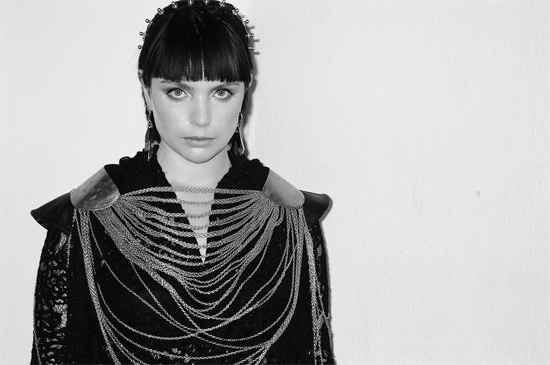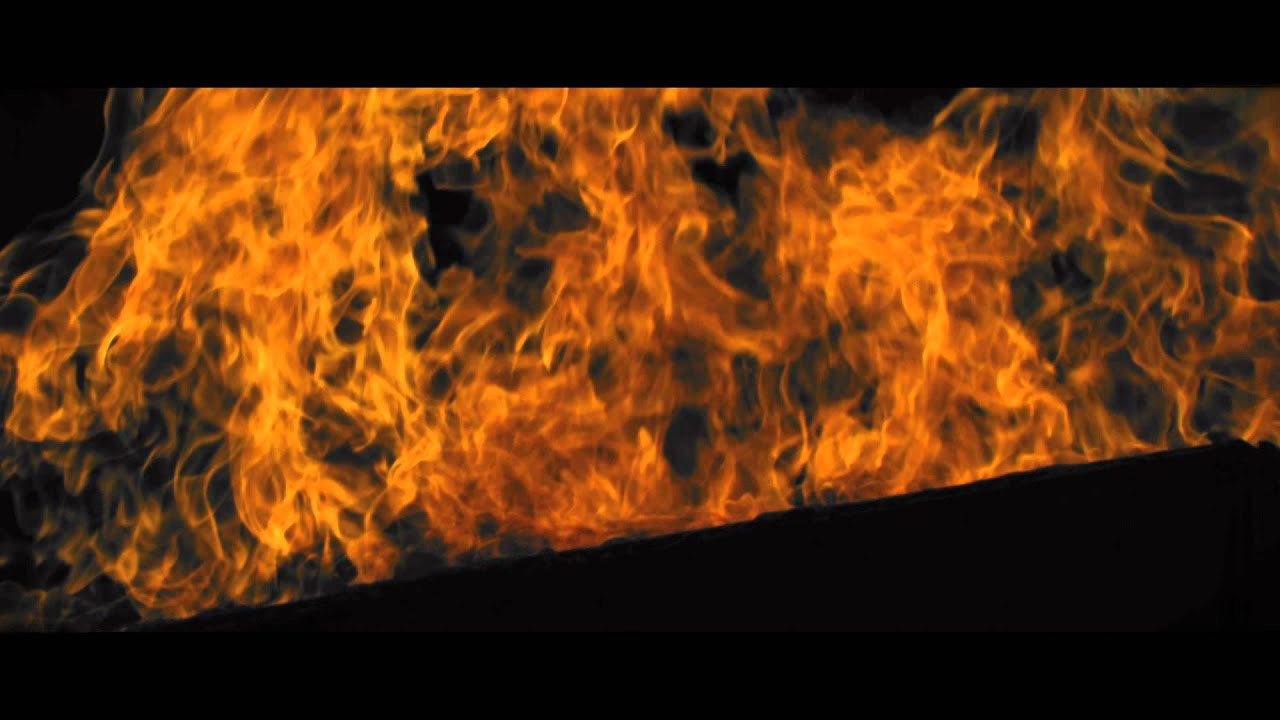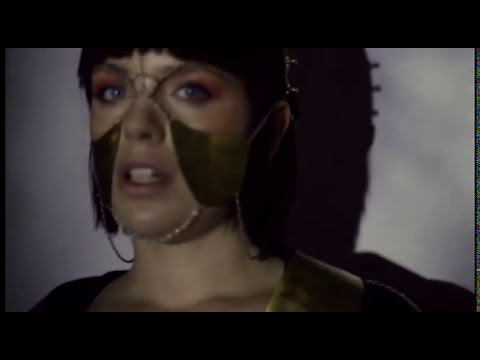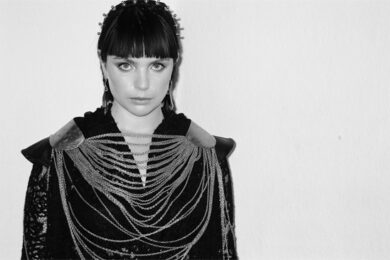For a sound that started off brooding in bedrooms and basements in South and East London, dubstep has made some impressive moves over the last year or two. The various bastardised versions of the genre currently hitting the charts, winning Grammys and sending mainstream club crowds into frantic mosh-offs offer reasonable proof as to the versatility of its basic form. However, they’re also fundamentally unimaginative in their use of dubstep as source material – it’s all the same old loping rhythms and heaving low end, with extra dollops of sweaty teen angst or greasy-haired Tiesto trance chucked into the mix for good measure.
With a string of early singles culminating in last year’s self-titled debut album, Berlin resident Emika drew inspiration from dubstep into pop of a different variety. Tapping into the deep, dubby end of the genre, where atmosphere and pressure are favoured over dancefloor immediacy, she used its bass-weight as the backdrop for a series of frosty songs. Stirring in skeletal piano lines (she’s a classically trained pianist) and the harsher, more mechanistic feel of her home city’s techno sounds, her early singles and album put forward a hybrid electronic pop, one drawing inspiration from any number of club genres without resorting to simple copyism.
Her degree and previous working history in sound design certainly helped – album highlight ‘Professional Loving’, for example, was beautifully produced, buffeting her ice queen vamp with punchy sub-bass and the strains of an underwater choir. They also provided the basis for one of the most interesting projects she’s been involved in: in 2010 she recorded samples of the innards of Berlin’s iconic Berghain/Panoramabar club space, to be used as the basis for the club’s label Ostgut Ton’s fifth birthday compilation, Funf. They were then reworked into a whole 2CD’s worth of house and techno tracks by the club’s residents, who were able to generate atmosphere by utilising the sound of the building itself.
The latest single taken from the album, ‘3 Hours’, was released last week, and featured an excellent collaborative take on the original with fellow Berlin resident Jimmy Edgar. It’s the first (sort of) new material we’ve heard from Emika since the album, though she’s currently working on her second LP and touring extensively. In an interview that took place over the last few months (the first part was before the album’s release), Emika spoke to the Quietus about her first experiences of techno and dubstep, learning to sing opera and the cheeky creaking of Berghain sex swings.
How was the process of making your debut album? Was it quite arduous?
Emika: it took me a long time to settle on what I actually wanted to do, because I moved from Bristol to Berlin and got overwhelmed with techno and everything happening here, and I was really influenced by that. But I was also very nostalgic about all the bass music I’d experienced in Bristol, and then I was still playing classical piano and watching films, and wanting to do film scores, and it was very difficult for me to work out my way of songwriting.
Was moving to Berlin the catalyst for your music?
E: Definitely. I studied Creative Music Technology, and that was really heavily focused on perceptions of sound and art and creativity, using technology, but you never sat down and were taught how to use software. It was quite tough but really good, because it was so sound oriented. But by the end of the degree I was really confused, I didn’t know what music was anymore and what sound really meant, and what to do with sound. I was really fascinated with the sounds of my radiators and wanted to record them, but it just seemed a bit pointless.
But then coming to Berlin was when I really discovered techno, which is solely based around sound, and that’s why I fell in love with techno – because I was hearing similar sounds in the music, but there was a purpose for it, for people to come together and dance. So all these really abstract sounds suddenly became this really amazing lifestyle you could do something with. Ninja were always really nervous about me talking about techno, because it’s Ninja Tune, they’re based in sampling and hip-hop, and here I am with synthesizers…
When I interviewed Jon from Coldcut a couple of years ago, he referred to four-to-the-floor as a ‘usurper’, about back when they were setting up Ninja.
E: I love Jon [laughs]. But just to explain, that’s why I love techno. There is a home and a scene for really abstract, kind of psychologically-based sound art. Up until then I just experienced that stuff in a really dry, academic environment, where everyone was stroking their chins, and concerts where everyone would sit down. You do a concert and everyone claps, but no-one’s sure why they’re clapping, it’s just the end. It was very meaningless for me, so it was just great to discover techno. I’m not so into the four-to-the-floor rhythm, I just like the fact that you can go wild with abstract sounds and people will love it.
But songwriting away takes you away from the exclusively dancefloor end of things. So was writing songs, as opposed to tracks, a conscious move?
E: Yeah. I don’t really understand why electronic music has to always be ‘tracks’, and has to always be sound effects. I think because I come from a classical background and worked a lot with orchestras when I was younger, I guess I had that school of thought when I started using software. There can be so many possibilities of what makes people dance or not dance, or feel sad or happy, and there are so many things you can do with music and sound.
I just think that with the possibilities we have today – I could sit here and make so much stuff with just a laptop – I kind of feel that it’s my duty with music to show off some stuff, or present some new perspectives. I don’t know if I’ve really achieved that, but it’s definitely what keeps me wanting to make music, just keep surprising myself and keep learning new stuff about sound.
I guess coming from a classical background, that sense of wanting to always learn new things must be ingrained.
E: Exactly. I’ve recently started having classical opera singing lessons, which are absolutely amazing. I haven’t had any classical lessons for about seven or eight years, and it’s so amazing going back to something traditional and disciplined and classical. I can really observe that school of thought and the way it influences me and the way it’s structured. And it’s so beautiful, I would encourage everyone to try to experience some kind of traditional music playing and thinking.
[Through having opera lessons], I’ve discovered that up until now I haven’t really been singing, I’ve been using voice and vocals and a lot of production to make it sound how it sounds. It wasn’t really my resonant voice, and I’m learning to start the sound here [indicates bridge of nose]. Up until then I thought singing started here [gestures throat]! But it’s amazing because I’ve discovered I’m actually a really high soprano, and can reach all these fantastic high-notes. I’m learning how to make my face resonate – you feel the sound come up the back of your neck, and out of your head. Whenever my teacher says ‘that’s an amazing sound’, that’s always when I can’t see – because your eyes vibrate. That’s why I feel like it’s been this deeply spiritual experience, because I go to her, and she takes me higher and higher up the piano, and I get all headrushy, then I pay her money and leave!
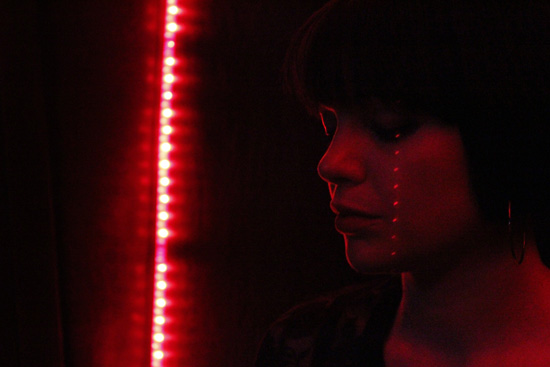
Does the bass-heavy aspect to your music come from the Bristol influence?
E: Yeah, I mean, I moved to Bristol as this really young kid. I went to a [Dubloaded] party and saw [Digital Mystikz] playing, and it was just mindblowing. There was hardly any music, just occasional bass, and occasional dub voices, and it just felt like this vast ocean of space. There was no lights, no stage, just some Jamaican dude selling Red Stripe in the corner for three pounds or something, and everyone was there with their jackets on in this mouldy space. It was almost like there was nothing of substance in the physical world there, there was nothing but the sound. There weren’t even many people there to talk to, or girls to dance with, it was just this mouldy room and bass.
When I found completely amazing about it when I first heard dubstep in a club was how alien it was, I’d never experienced anything like that before. I just found myself thinking ‘I’ve never heard anything like this before, I don’t know what this is, nor do I know how this is made’.
E: Also, [Digital Mystikz’s] Mala is a mystery wrapped in an enigma. He’s a friend of mine, but I still have no fucking idea where his music comes from. I’ve worked with him before, and I don’t know what he’s doing, he’s just there, and then a few hours later this complete universe has been built.
His music’s incredible. I still think that out of all the original people who made dubstep, he’s the only one who has the capacity to still shock me, in a way, still sound as incredibly unreal as it did the first time I heard his stuff.
E: I get really excited about knowing him because I love Augustus Pablo. There’s not many photos of him, but I’ve got a couple of boxsets, like The Mystic World of Augustus Pablo – for me Mala’s like the modern day version. I think he works with bass because it’s a spiritual thing, rather than a trendy thing to do. I think that’s why we still hear that special quality in his music.
You recorded samples of the Berghain space for Ostgut Ton’s Funf compilation in 2010, right? How did that come about?
E: To be honest, I was totally wasted in Panoramabar, and I’d been there for probably about fifteen hours. I’d become really good friends with Nick Hoppner who runs the label. So there was this one time in Panoramabar when he was DJing and I thought ‘Brilliant, now’s my chance, I can hang out behind the decks.’
So I went back there, and I don’t know what happened, I think I was trying to get my jacket. I grabbed it, and the needle went [makes sound of needle scraping across vinyl]. And all the Sunday crowd of cool people were there, having a great time, and the music just stopped, and everybody looked at me. I didn’t realise what I’d done, because I was leaning against the wall when the music stopped, and it took five seconds for the sound to finish, it carried on resonating. I was so in the moment of the building finishing the sound. The record stopped, then the building stopped vibrating, because everything in there rattles, it’s an old power station that was never hooked up to the grid. I felt the resonance from the building, and I was thinking ‘fuck’, then the music went back on and I was looking around, seeing all the lights, and the motors and the guy on the light desk, and I could hear people at the bar in the few seconds the music was off. This all happened really quickly.
One of those fleeting moments of clarity in a really heavy night out. That point when you suddenly become really lucid for a matter of seconds before lapsing again.
E: That’s exactly it! Everyone stopped dancing, looking really pissed off, and there was just me going [stares into space vacantly]. And then Nick was laughing at me and carried on DJing, and I said ‘We need to have dinner!’ Then I carried on dancing and I was thinking ‘you could record that, and that, and that’. But I didn’t want it to be the sort of project I would have done at university, again relating to function and form and meaning, so that’s when I thought, brilliant, I’ll record an amazing sample library of this space, and the whole scene in a way, and hand it over to the resident producers and DJs and they can make music with it.
It must have been really interesting to see the building itself from so many different perspectives.
E: It was fantastic to see it with the lights on in the daytime, and to meet all the people that work there just fixing things, they don’t care about parties and techno. It’s a strange place. Just the fact that people can live in so much harmony, among such alcoholism and all the rest of it, feels like heaven. It’s just this dirty, industrial power building, where everyone goes to get wasted – it’s that simple – but you’re there and you’re like ‘Wow, my God, I’ve found heaven!’
Did you use any of the Funf samples on your album?
E: There’s a track called ‘Be My Guest’, which is instrumental, the ‘track’ one, and that’s got the sound of sex swings. If you listen quite closely to the outro, you can hear them creaking.
That’s nicely seedy.
E: I hope the whole record is nicely seedy [laughs]. Like a very slow-burn, sleazy vibe.
You collaborated with Jimmy Edgar to rework your latest single, ‘3 Hours’. What was it like working with him, and was it a proper collaborative process, or more a remixing/passing back and forth process?
E: Jimmy made a lot of great beats and vibes, with my vocal together, and I got more and more obsessed with him singing as well as me. The collab, in the first couple of months, consisted of me phoning him up and shouting loudly in an inspiring manner, “Jimmy you are so fucking amazing and you sing and I want you to sing. Make a song with your voice that is better than my original and make me jealous."
Then it clicked in my head – Jimmy is multifunctional and multitalented, he can make me a video too! We have the same agent, we shot in my agent’s bedroom in Berlin, and Jimmy got his fashion and stylist friends involved, and they’ve become my friends. You will never make anything worth releasing for people, if you don’t have a real and loving connection to the people you work with creatively. Everything I have done collaboratively has come from good connections. Otherwise, what the fuck are you doing? Modeling music?
What are you up to at the moment? How is touring and work on your new album going?
E: I am about to turn on my new Allen & Heath Mix Wizard and record my new synth instrumentals sketches for my second LP. I really want to show them to Ninja and to my friends.
Recently I’ve made friends with Horst-Krzbrg club [in Berlin] and they let me test my synths and new music on the PA sometimes. I am all about making music for people, making vibes that do great things to people, so in between composing albums it is very important I slip into the audience’s perspective and tell myself as the composer: make it better, make it more wild, make it exciting, not cool. There’s so much music in the world already which is about expressing the self, or prescribing a lifestyle, or only for the sake of the avant-garde, or for ‘sounds-sake’, or for DJ conventions. So what about all the other billions of life layers that music fails to touch?
I am also getting incredibly excited about the future. Nina Kraviz gives me so much hope. I’ve never had another girl in the scene I can look up to and respect. She gave me her [upcoming self-titled] LP the other day and it gives me goosebumps. It’s only a matter of time before pop stars, singing music written for them by old dudes, all the shit that’s wrong in the music world – entertainment, glamor, fear, marketed nudity – it’s time for all that hollow shit to step into the shadows and make way for real women doing real shit. If I was 12 or 14 years old, and I could buy a magazine with Nina on the cover, mixing and singing, and talking about how she set up club nights in Moscow… This is so real and great.
Lastly, and most importantly – touring is the most amazing job in the whole world. All my music comes directly from the people. From interesting interviews I’ve had with smart people, from my audiences at shows around the world, from what people write to me privately. I always thought I would become a great nerd studio monkey and stay behind the scenes. But that world threw me out, and the stage created a home for me, organically. I have no acting experience or training, or any pre-planned show ideas. I just get up and do my thing, give to the people, like they give to me. It’s an amazing thing. People together. Collectivity.
Photos by Jimmy Edgar and Liz Eve

